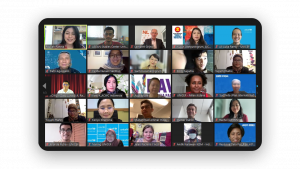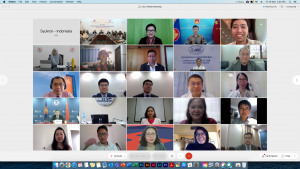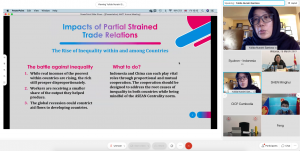By Habibah Hasnah Hermanadi, M.A (Photo: thailand-business-news.com)
India has been “acting east” for quite a while now but how does the East respond? Well, if the East in this context can be represented by Southeast Asia then not much. The annual State of Southeast Asia 2021 report that was recently published by the ASEAN Study Centre captured the degree of distrust ASEAN and Southeast Asian countries have toward India. Where we can see how India stood up among other influential foreign powerhouses. Southeast Asia warmed up to Japan and European Union. In the past, the countries distanced itself from the United States under President Donald Trump, but that view is currently changing presumably affected by the newly inaugurated President Joe Biden and Vice President Kamala Harris marking new beginnings and democratic hope. However, India’s persistence in making a more significant presence had been viewed more cautiously with 50.8% proclaiming of no confidence and less than 19% of confidence. It had slightly decreased from 53.5% in 2020. However, the number had increased quite drastically in the last couple of years considering it used to be around 45.6% in 2019.
Whither India in Southeast Asia?
The report highlighted there was greater distrust Southeast Asian countries have for China. Nonetheless, there was not much momentum gained by India in the face of such change. Prior to this, India claimed to be willing and able to take this leadership role when it comes to ASEAN, but as it was reflected in the status quo it does not seem to go to that direction. With that being said, India is still an outsider. State-wise in the context of foreign policies this is rather expected. Factually, the relation is considerably at its fetal state if it is compared to Japan’s affluence in the Southeast region.
Why the distrust? While the survey emphasized the question of whether India will do “the right thing” this does not reflect well on ASEAN. India should evaluate their strategy, perhaps this idea of rekindling kinship and including India in the Southeast Asian affairs are not going as they intended to be. With a lack of foreign policy maneuvers that are catered to the socioeconomic-cultural and values that are centering Southeast Asia. New Delhi’s pragmatism might not work for this case. The distance remained, India should not be using the same strategy as they do in South Asia as it is in Southeast Asia.
Time for New Delhi’s Softer’ Side
For so long, New Delhi does not shy away from various military and security-related agreements in Southeast Asia. In Myanmar this commitment is visible, India agreed to supply arms and equipment needs for joint border patrol in addition to Indian warships that make regular calls at Myanmar’s ports. Recently at the India-Vietnam Summit, the two signed seven agreements in areas as diverse as defense, petrochemicals, renewable and nuclear energy furthering their agreement for cooperation between their defense industries in a total of 600 million USD. In another case, the Philippines expressed their deepening interest in attaining the first India-Russia Cruise missile or BrahMos supersonic cruise missile, the purchase is deeply motivated by their concern of China active movement in the South China Sea. In Indonesia, the continuation of India-Indonesia Coordinated Patrol (IND-INDO CORPAT) remains vital to India’s SAGAR (Security and Growth for All in the Region) vision that heavily maritime reliant.
Comparing India’s determination within the Quadrilateral Security Dialogue or the Quad, a forum that is manifested out of security purposes, is not alike with engaging with ASEAN or Southeast Asia. All Quad members willingly bridge their interest through a common security objective that is to balance the ever-growing presence of China. India cannot enter ASEAN through the same means. If Indo-Pacific is still relevant until today, then diversify the strategy in approaching each member state and speak the language of its community. For all they know the majority of ASEAN countries declared the concept of Indo-Pacific to be unclear and still need further elaboration. The distance pertained due to the inability to translate the ASEAN way that is heavy on values and political characteristics. This went beyond mere speaking the political language among the states but also comprehend the socio-cultural response ASEAN member countries have in viewing external actors. Not until India had successfully submerged into one of its inner-circle in Southeast Asia that sense of foreignness will remain.
However, it does not mean New Delhi has not tried to use its soft power capacity in exercising its foreign policy. It was only 2018 when Narendra Modi established the ASEAN-India Research Training Fellowship that is intended to reach out to Southeast Asia through research and development in technology and science in India’s top technological Institutions. Perception management is pertinent in this matter to diminish the distance and gradually gaining a more meritorious spot in the heart of the ASEAN countries.
In this Economy?
The report also covered how China remained a strong economic influence in Southeast Asia. Furthermore, Beijing continuously disregards New Delhi’s attempts of closing in the region. Firstly through dismissing Indo-Pacific completely in various forums and secondly by proclaiming this diplomatic reach as a futile effort. The effort might not be futile as it was framed by China, but at the same time not as fruitful. When India’s foreign policy paradigm shifted from looking to acting, this also implied a degree of engagement, something that is translated rather too simplistic by New Delhi. New Delhi branded itself as a benign and responsible rising power in comparison to the expansive and revisionist Beijing, but these claims did not affect China’s economy and present among ASEAN countries.
Interestingly, just last year India withdrew itself from Regional Comprehensive Economic Partnership (RCEP) on its brink of agreement. Jaishankar, Minister of External Affairs pointed out how India’s needs were not addressed thus questioning the intention to take part in the agreement. The need to deepen economic engagement is blocked by India’s defensive, protectionist approach to international trade. Moreover, in the case of working with ASEAN, this became apparent at the last ASEAN-India Economic ministers meeting in August 2020. Both parties failed to issue a joint media statement. To trace the root of failure, the parties are in disagreements over the scope of the scheduled ASEAN-India Trade in Goods Agreement (AITIGA) review. On one side, India initiated the importance of the review to focus on AITIGA implementation and most importantly to address its trade deficit with ASEAN. However, ASEAN wanted the review to extend trade liberalization and facilitation.
Conclusion
So far, the Act East policy in Southeast Asia has been hot and cold. This implied lack of commitment to push further or even to achieve the so-called engagement. India claimed growing strategic partnership through more military-related agreements such as in Myanmar, Indonesia, Vietnam, and the Philippines are progressing enough. It might progress but not to the imagined significance New Delhi portrayed itself to be. For these agreements are happening away from the community, it became another decent deal signed merely in the transactional framework away from engagement. In addition to that backing off from RCEP is quite the relationship stain just as much as the inability to find common grounds on free trade and trade facilitation with ASEAN. In this case, domestic affairs are not to blame, in fact, a chance to seize the momentum and commit with the action plan as foreign and domestic supposed to work altogether.
Habibah Hasnah Hermanadi, MA.
Habibah is a political researcher with a master’s degree from the Department of Political Science, University of Delhi. Feel free to access her research and publications here.

 The discussion highlighted a number of issues including the role of CSOs and the academic community which is to support the State in undertaking the obligation as duty bearer in fulfilling the rights of Children, to contribute to CRC Alternative Report CRC in order to support the government efforts on implementing CRC including ensuring child participation, to undertake research on the situation and well-being of women and children, and contribute on implementing Concluding Observation of CRC beneficial as foundation works on measures to child rights realizations.
The discussion highlighted a number of issues including the role of CSOs and the academic community which is to support the State in undertaking the obligation as duty bearer in fulfilling the rights of Children, to contribute to CRC Alternative Report CRC in order to support the government efforts on implementing CRC including ensuring child participation, to undertake research on the situation and well-being of women and children, and contribute on implementing Concluding Observation of CRC beneficial as foundation works on measures to child rights realizations. On a similar note, Dr. Nguyen Hung Son, the Vice President of Diplomatic Academy of Viet Nam (DAV), acknowledged that the forum could be a platform to discuss and comprehend each view on the Southeast Asia region’s development. On this occasion, the panel is expected to promote good relationships and bring prosperity to the parties. As an essential dialogue partner, a substantive partnership among NACT members is needed in order to construct ideal regional architecture. In regards to current challenges, the foundation of the cooperation must be based on responsibility and responsiveness.
On a similar note, Dr. Nguyen Hung Son, the Vice President of Diplomatic Academy of Viet Nam (DAV), acknowledged that the forum could be a platform to discuss and comprehend each view on the Southeast Asia region’s development. On this occasion, the panel is expected to promote good relationships and bring prosperity to the parties. As an essential dialogue partner, a substantive partnership among NACT members is needed in order to construct ideal regional architecture. In regards to current challenges, the foundation of the cooperation must be based on responsibility and responsiveness. The meeting was concluded with a hope to enhance mutual trust and understanding between China and ASEAN member states, as well as exchanging knowledge and perspective to ensure stability, resilience, and development in the region.
The meeting was concluded with a hope to enhance mutual trust and understanding between China and ASEAN member states, as well as exchanging knowledge and perspective to ensure stability, resilience, and development in the region.